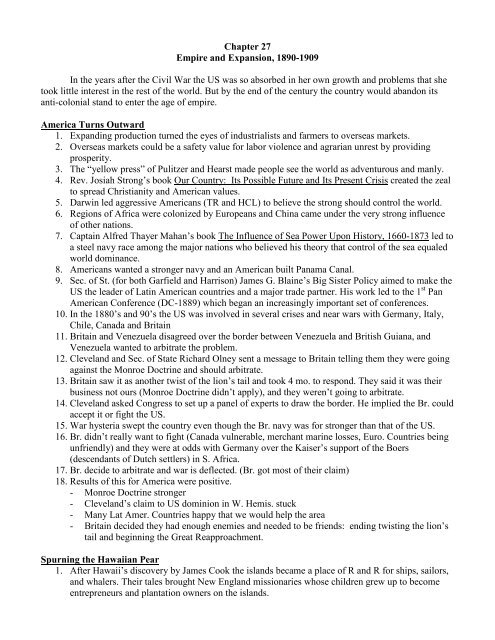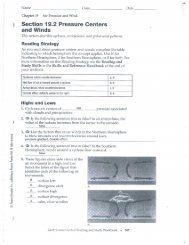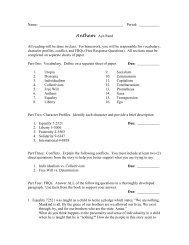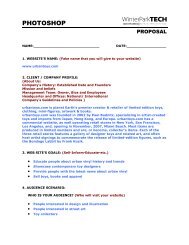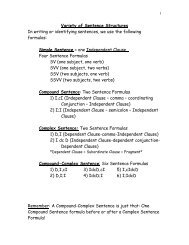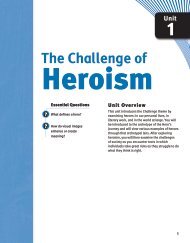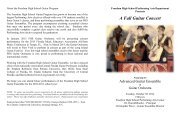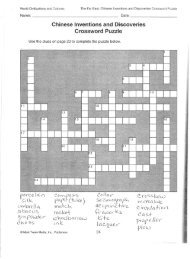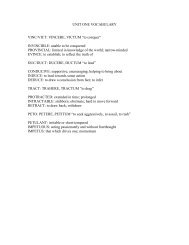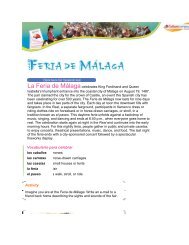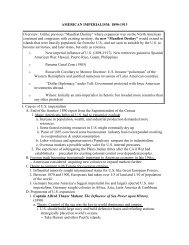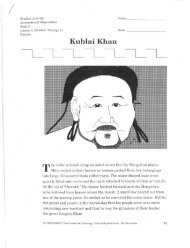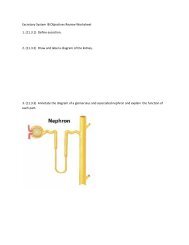Chapter 27 Empire and Expansion, 1890-1909 In the years after the ...
Chapter 27 Empire and Expansion, 1890-1909 In the years after the ...
Chapter 27 Empire and Expansion, 1890-1909 In the years after the ...
Create successful ePaper yourself
Turn your PDF publications into a flip-book with our unique Google optimized e-Paper software.
<strong>Chapter</strong> <strong>27</strong><br />
<strong>Empire</strong> <strong>and</strong> <strong>Expansion</strong>, <strong>1890</strong>-<strong>1909</strong><br />
<strong>In</strong> <strong>the</strong> <strong>years</strong> <strong>after</strong> <strong>the</strong> Civil War <strong>the</strong> US was so absorbed in her own growth <strong>and</strong> problems that she<br />
took little interest in <strong>the</strong> rest of <strong>the</strong> world. But by <strong>the</strong> end of <strong>the</strong> century <strong>the</strong> country would ab<strong>and</strong>on its<br />
anti-colonial st<strong>and</strong> to enter <strong>the</strong> age of empire.<br />
America Turns Outward<br />
1. Exp<strong>and</strong>ing production turned <strong>the</strong> eyes of industrialists <strong>and</strong> farmers to overseas markets.<br />
2. Overseas markets could be a safety value for labor violence <strong>and</strong> agrarian unrest by providing<br />
prosperity.<br />
3. The “yellow press” of Pulitzer <strong>and</strong> Hearst made people see <strong>the</strong> world as adventurous <strong>and</strong> manly.<br />
4. Rev. Josiah Strong’s book Our Country: Its Possible Future <strong>and</strong> Its Present Crisis created <strong>the</strong> zeal<br />
to spread Christianity <strong>and</strong> American values.<br />
5. Darwin led aggressive Americans (TR <strong>and</strong> HCL) to believe <strong>the</strong> strong should control <strong>the</strong> world.<br />
6. Regions of Africa were colonized by Europeans <strong>and</strong> China came under <strong>the</strong> very strong influence<br />
of o<strong>the</strong>r nations.<br />
7. Captain Alfred Thayer Mahan’s book The <strong>In</strong>fluence of Sea Power Upon History, 1660-1873 led to<br />
a steel navy race among <strong>the</strong> major nations who believed his <strong>the</strong>ory that control of <strong>the</strong> sea equaled<br />
world dominance.<br />
8. Americans wanted a stronger navy <strong>and</strong> an American built Panama Canal.<br />
9. Sec. of St. (for both Garfield <strong>and</strong> Harrison) James G. Blaine’s Big Sister Policy aimed to make <strong>the</strong><br />
US <strong>the</strong> leader of Latin American countries <strong>and</strong> a major trade partner. His work led to <strong>the</strong> 1 st Pan<br />
American Conference (DC-1889) which began an increasingly important set of conferences.<br />
10. <strong>In</strong> <strong>the</strong> 1880’s <strong>and</strong> 90’s <strong>the</strong> US was involved in several crises <strong>and</strong> near wars with Germany, Italy,<br />
Chile, Canada <strong>and</strong> Britain<br />
11. Britain <strong>and</strong> Venezuela disagreed over <strong>the</strong> border between Venezuela <strong>and</strong> British Guiana, <strong>and</strong><br />
Venezuela wanted to arbitrate <strong>the</strong> problem.<br />
12. Clevel<strong>and</strong> <strong>and</strong> Sec. of State Richard Olney sent a message to Britain telling <strong>the</strong>m <strong>the</strong>y were going<br />
against <strong>the</strong> Monroe Doctrine <strong>and</strong> should arbitrate.<br />
13. Britain saw it as ano<strong>the</strong>r twist of <strong>the</strong> lion’s tail <strong>and</strong> took 4 mo. to respond. They said it was <strong>the</strong>ir<br />
business not ours (Monroe Doctrine didn’t apply), <strong>and</strong> <strong>the</strong>y weren’t going to arbitrate.<br />
14. Clevel<strong>and</strong> asked Congress to set up a panel of experts to draw <strong>the</strong> border. He implied <strong>the</strong> Br. could<br />
accept it or fight <strong>the</strong> US.<br />
15. War hysteria swept <strong>the</strong> country even though <strong>the</strong> Br. navy was for stronger than that of <strong>the</strong> US.<br />
16. Br. didn’t really want to fight (Canada vulnerable, merchant marine losses, Euro. Countries being<br />
unfriendly) <strong>and</strong> <strong>the</strong>y were at odds with Germany over <strong>the</strong> Kaiser’s support of <strong>the</strong> Boers<br />
(descendants of Dutch settlers) in S. Africa.<br />
17. Br. decide to arbitrate <strong>and</strong> war is deflected. (Br. got most of <strong>the</strong>ir claim)<br />
18. Results of this for America were positive.<br />
- Monroe Doctrine stronger<br />
- Clevel<strong>and</strong>’s claim to US dominion in W. Hemis. stuck<br />
- Many Lat Amer. Countries happy that we would help <strong>the</strong> area<br />
- Britain decided <strong>the</strong>y had enough enemies <strong>and</strong> needed to be friends: ending twisting <strong>the</strong> lion’s<br />
tail <strong>and</strong> beginning <strong>the</strong> Great Reapproachment.<br />
Spurning <strong>the</strong> Hawaiian Pear<br />
1. After Hawaii’s discovery by James Cook <strong>the</strong> isl<strong>and</strong>s became a place of R <strong>and</strong> R for ships, sailors,<br />
<strong>and</strong> whalers. Their tales brought New Engl<strong>and</strong> missionaries whose children grew up to become<br />
entrepreneurs <strong>and</strong> plantation owners on <strong>the</strong> isl<strong>and</strong>s.
2. Americans began to view Hawaii as a part of <strong>the</strong> US <strong>and</strong> warned o<strong>the</strong>r powers away. We made a<br />
commercial reciprocity treaty in 1875 <strong>and</strong> in 1887 we got <strong>the</strong> right to use Pearl Harbor.<br />
3. The McKinley Tariff put duties on Hawaiian sugar in <strong>the</strong> US which upset <strong>the</strong> white planters. Since<br />
<strong>the</strong>y were mostly Americans <strong>the</strong>y decided to get Hawaii annexed to <strong>the</strong> US so <strong>the</strong>re would be no<br />
tariff.<br />
4. They created a rebellion <strong>and</strong> had US Marines assist in putting it down. Then a treaty of annexation<br />
was sent to DC. Clevel<strong>and</strong>, who felt <strong>the</strong> US was in <strong>the</strong> wrong, withdrew <strong>the</strong> treaty <strong>and</strong> sent a fact<br />
finder.<br />
5. Clevel<strong>and</strong> refused to allow <strong>the</strong> annexation but could not put Queen Lili back on <strong>the</strong> throne without<br />
sending an army. (Amer. Public would have had a fit.)<br />
6. The situation set off out 1 st full fledged imperialistic debate.<br />
Cubans Rise in Revolt<br />
1. Cubans rise against Spanish governors (again) in 1895.<br />
2. Much of <strong>the</strong> problem was economic. The 1894 tariff was lessening <strong>the</strong> dem<strong>and</strong> for Cuban sugar<br />
3. The insurrectos burned canfields <strong>and</strong> sugar mills hoping to drive Spain out or pull <strong>the</strong> US in to<br />
help <strong>the</strong>m.<br />
4. Americans were sympa<strong>the</strong>tic to <strong>the</strong>ir fight for freedom, were aware of <strong>the</strong> effects of <strong>the</strong> rebellion<br />
on US <strong>and</strong> Cuban investments <strong>and</strong> trade, <strong>and</strong> were concerned about how Spain’s control of Cuba<br />
could hurt shipping <strong>and</strong> a Central American Canal.<br />
5. Spanish sent General Weyler (Butcher), who used cruel methods <strong>and</strong> reconcentration camps to<br />
keep <strong>the</strong> populace from helping <strong>the</strong> rebels.<br />
6. Americans wanted Clevel<strong>and</strong> to recognize <strong>the</strong> rebels but as an anti-jingoist/ anti-imperialist he<br />
vowed not to send <strong>the</strong> troops if Congress declared war.<br />
7. Hearst <strong>and</strong> Pulitzer were in duel for circulation <strong>and</strong> <strong>the</strong>ir papers tried to out scoop each o<strong>the</strong>r in<br />
reporting atrocities. Small papers followed in <strong>the</strong>ir footsteps. Americans are made even more irate.<br />
8. Spain recalled Weyler <strong>and</strong> discussed giving <strong>the</strong> Cubans some self-rule. Spaniards in Cuba were so<br />
upset by <strong>the</strong> idea that <strong>the</strong>y rioted.<br />
9. DC sent <strong>the</strong> battleship Maine to Cuba to protect <strong>and</strong> evacuate Americans if necessary.<br />
10. Hearst printed a private letter from Sp. Minister to <strong>the</strong> US Dupuy de Lome. He called McKinley<br />
an ear- to- <strong>the</strong>- ground politician who couldn’t be trusted. Americans so upset de Lome had to<br />
resign.<br />
11. 260 men died when <strong>the</strong> Maine blew up in Havana Harbor.<br />
12. The US <strong>and</strong> Spain both investigated. Spanish felt it was <strong>the</strong> result of an internal accident. The US<br />
said <strong>the</strong> ship had been mined.<br />
13. The Sp. Offer to arbitrate but <strong>the</strong> US refused<br />
14. <strong>In</strong> 1976 a US admiral determines <strong>the</strong> explosion probably was an accident<br />
15. US becomes war mad <strong>and</strong> <strong>the</strong>ir battle cry is “Remember <strong>the</strong> Maine!”<br />
16. American diplomats had gained Sp. agreement to end <strong>the</strong> reconcentration camps <strong>and</strong> to sign an<br />
armistice with <strong>the</strong> rebels.<br />
17. McKinley, Hanna <strong>and</strong> Wall Street did not want war, but <strong>the</strong> public (due to “Yellow Journalism”<br />
<strong>and</strong> <strong>the</strong> prodding of Cuban exiles in <strong>the</strong> states) did.<br />
18. McKinley didn’t really expect <strong>the</strong> Spanish to follow through on promises <strong>the</strong>y had made before,<br />
he believed in <strong>the</strong> rule of <strong>the</strong> people, <strong>and</strong> he didn’t want to give <strong>the</strong> Democrats election fodder, so<br />
on 4/11/1898 he sent Congress a war message.<br />
19. The legislature declared war <strong>and</strong> passed <strong>the</strong> Teller Amendment proclaiming that when <strong>the</strong> US had<br />
overthrown Spain <strong>the</strong>y would give Cuba her freedom.
Dewey’s May Day Victory at Manila<br />
1. Americans went to war with great enthusiasm.<br />
2. The US Army was comm<strong>and</strong>ed by Civil War officers <strong>and</strong> unprepared for war in <strong>the</strong> tropics <strong>and</strong><br />
vastly outnumbered by <strong>the</strong> Sp. Army in Cuba. Sp. Navy seemed to be better than <strong>the</strong> US’s <strong>and</strong><br />
except for Br. (now more a US ally) Europe favored Sp.<br />
3. As Under Secretary of <strong>the</strong> Navy, Theodore Roosevelt took advantage of <strong>the</strong> secretary’s absence to<br />
cable Commodore George Dewey, who was comm<strong>and</strong>ing <strong>the</strong> Asiatic Squadron in Hong Kong,<br />
telling him to attack <strong>the</strong> Philippines if war started. McKinley later confirmed <strong>the</strong> order.<br />
4. On 5/1/98 Dewey sailed into Manila Bay <strong>and</strong> attacked <strong>the</strong> antiquated Sp. Fleet. The Sp. lost <strong>the</strong><br />
battle <strong>and</strong> almost 400 men (No US sailors died.).<br />
5. Dewey had defeated <strong>the</strong> Sp. Navy, but he couldn’t take Manila, so he had to wait for troops from<br />
<strong>the</strong> US.<br />
6. O<strong>the</strong>r countries sent warships to “protect <strong>the</strong>ir nationals” in <strong>the</strong> Philippines. Dewey almost went to<br />
war with Germany, but <strong>the</strong> Br. were friendly.<br />
7. Troops finally arrived <strong>and</strong> Americans worked with Filipino insurgents led by Emilio Aguinaldo,<br />
who had been brought from exile by Dewey, to defeat <strong>the</strong> Sp.<br />
8. Events in <strong>the</strong> Philippines made America convinced that <strong>the</strong>y needed Hawaii as a coaling station.<br />
Hawaii was willing to cooperate, America wanted Hawaii, <strong>and</strong> Congress annexed it.<br />
9. Hawaiians became citizens in a US territory.<br />
The Confused <strong>In</strong>vasion of Cuba<br />
1. Despite his protests that his fleet would be destroyed, Sp. ordered Admiral Cervera to take his<br />
ships to Cuba.<br />
2. Americans on <strong>the</strong> Eastern seaboard expected to be invaded <strong>and</strong> panicked.<br />
3. Cervera sailed in <strong>the</strong> harbor at Santiago, Cuba <strong>and</strong> was bottled up by <strong>the</strong> American fleet.<br />
4. US government decided to send an unprepared army across Cuba to drive Cervera out.<br />
5. Theodore Roosevelt was <strong>the</strong> principal organizer of a group of cowboys, hearty characters, ex-polo<br />
players, <strong>and</strong> ex-convicts who were led by Leonard Wood. They became known as <strong>the</strong> Rough<br />
Riders<br />
6. <strong>In</strong> June 1898 amid much chaos <strong>the</strong> army sailed from Tampa <strong>and</strong> l<strong>and</strong>ed near Santiago.<br />
7. Fighting occurred on July 1 between <strong>the</strong> US <strong>and</strong> Sp. troops. The Rough Riders were very involved<br />
<strong>and</strong> TR evidently thought it was great fun!<br />
Curtains for Spain in America<br />
1. As <strong>the</strong> American army closed in from <strong>the</strong> rear, a protesting Admiral Cervera was ordered to fight.<br />
As he expected his fleet was destroyed, (500 Sp. Deaths to 1 American)<br />
2. Soon <strong>after</strong> <strong>the</strong> naval loss Santiago surrendered.<br />
3. American troops headed to PR where most of <strong>the</strong> people greeted <strong>the</strong>m as liberating heroes<br />
4. On August 12, 1898 Spain <strong>and</strong> <strong>the</strong> US signed an armistice<br />
5. The American Army was laid low by malaria, typhoid, dysentery, yellow fever, <strong>and</strong> embalmed<br />
beef.<br />
6. With TR as a ringleader dem<strong>and</strong>s were made to pull out <strong>the</strong> troops <strong>and</strong> <strong>the</strong>y were transferred to<br />
Long Isl<strong>and</strong>, NY ending <strong>the</strong> “Splendid Little War.”<br />
7. A sc<strong>and</strong>al of <strong>the</strong> war was <strong>the</strong> death rate from disease; especially typhoid which was rampant in <strong>the</strong><br />
unsanitary camps<br />
America’s Course (Curse) of <strong>Empire</strong><br />
1. The 1898 meeting between <strong>the</strong> US <strong>and</strong> Spain in Paris decided that Cuba was free that America got<br />
Guam <strong>and</strong> Puerto Rico, <strong>and</strong> that (<strong>after</strong> much soul searching by McKinley on <strong>the</strong> pros-spread
Christianity, profit from trade: <strong>and</strong> cons- can’t give back to Spanish misrule can’t ab<strong>and</strong>on <strong>and</strong><br />
have some else take <strong>the</strong> over) <strong>the</strong> US would pay Spain 20 m. for <strong>the</strong> Philippines (Spain was<br />
disputing over US right to take <strong>the</strong> Philippines because she felt it was not a spoil of war since<br />
Manila was captured <strong>after</strong> <strong>the</strong> armistice was signed.)<br />
2. The signing of <strong>the</strong> Pact of Paris created furious debate in <strong>the</strong> US. With <strong>the</strong> exceptions of Hawaii,<br />
Alaska. And a few small Pacific Isl<strong>and</strong>s we had only taken over contiguous l<strong>and</strong> in North<br />
America. Now we had taken on a far away people with a very different culture.<br />
3. The Anti-Imperialist League which was fighting this annexation included many prominent<br />
citizens. They argue that it was against our beliefs, that it was despotic <strong>and</strong> could lead to<br />
despotism at home, <strong>and</strong> it would involve <strong>the</strong> US in <strong>the</strong> problems of <strong>the</strong> Far East.<br />
4. The expansionist/imperialists appealed to patriotism <strong>and</strong> <strong>the</strong> desire for profits. They said it was<br />
America’s duty to uplift (<strong>and</strong> exploit) <strong>the</strong> poorer people of <strong>the</strong> world.<br />
5. Senate opposition to <strong>the</strong> treaty was very strong <strong>and</strong> it looked like it would fail until W.J Bryan<br />
supported it. He wanted to use Republican imperialism as a campaign issue in 1900.<br />
6. Bryan argued that we needed to officially end <strong>the</strong> war <strong>and</strong> that since we already had <strong>the</strong>m on our<br />
h<strong>and</strong>s we should accept <strong>the</strong>m so we could set <strong>the</strong>m free sooner. He got Democrats to vote for <strong>the</strong><br />
treaty <strong>and</strong> it passed.<br />
Perplexities in Puerto Rico <strong>and</strong> Cuba<br />
1. Puerto Rico’s population grew faster than its economy <strong>and</strong> <strong>the</strong> country was poor (as a result).<br />
2. The US passed <strong>the</strong> Foraker Act of 1900 which gave PR a limited amount of popular government.<br />
<strong>In</strong>1917, PR’s were given US citizenship.<br />
3. The US was responsible for many internal improvements in PR, but many of <strong>the</strong> people wanted<br />
<strong>the</strong>ir freedom.<br />
4. The question, “Does <strong>the</strong> Constitution follow <strong>the</strong> flag?” arose. Did US laws <strong>and</strong> rights fully apply<br />
in new territory?<br />
5. <strong>In</strong> a series of cases (The <strong>In</strong>sular Cases) which began in 1901 a divided Supreme Court decided that<br />
<strong>the</strong> answer was no. PR <strong>and</strong> <strong>the</strong> Philippines while ruled by <strong>the</strong> US did not have all US rights.<br />
6. Under <strong>the</strong> leadership of Rough Rider Wood many political <strong>and</strong> social improvements were made in<br />
Cuba (including <strong>the</strong> wiping out of yellow fever as a results of discoveries made by Dr. Walter<br />
Reed- a boon to <strong>the</strong> S. <strong>and</strong> Atlantic seaboard regions of <strong>the</strong> US too).<br />
7. The US honored <strong>the</strong> Teller Amendment <strong>and</strong> withdrew from Cuba in 1902<br />
8. Using US concern for Cuba’s vulnerability, <strong>the</strong> Cubans were forced to write into <strong>the</strong>ir 1901<br />
constitution <strong>the</strong> Platt Amendment.<br />
9. Under <strong>the</strong> Platt Amendment Cuba’s government bound <strong>the</strong>mselves not to endanger <strong>the</strong>ir<br />
independence through treaty or indebtedness. They gave <strong>the</strong> US <strong>the</strong> right to do military<br />
intervention to restore order <strong>and</strong> to provide mutual protection. Finally <strong>the</strong>y promised to sell/lease<br />
coaling/ naval stations to <strong>the</strong> US. We ended up with Guantanamo Bay as a result.(They can only<br />
get it back if both <strong>the</strong> US <strong>and</strong> Cuba agree.)<br />
New Horizons in Two Hemispheres<br />
1. The Spanish-American War let <strong>the</strong> world know that <strong>the</strong> US was a world power.<br />
2. Sp. Amer War= Splendid Little War because it was short, low in causalities, successful. Our world<br />
prestige rose <strong>and</strong> Europeans were more respectful of <strong>the</strong> US.<br />
3. A negative result for <strong>the</strong> US- it increased our indifference to our unpreparedness<br />
4. As shown by US’s enthusiasm for things like John Philip Sousa’s marches <strong>the</strong> war increased<br />
national pride <strong>and</strong> cockiness.<br />
5. Enthusiasms made it easier to become imperialistic.<br />
6. Latin America became suspicious of US greed.
7. Taking on <strong>the</strong> Philippines made <strong>the</strong> US a Far Eastern power <strong>and</strong> created <strong>the</strong> problem of defending<br />
<strong>the</strong> isl<strong>and</strong>s <strong>and</strong> America wasn’t willing to do so.<br />
8. The war supported Mahan’s big-navyism, <strong>and</strong> American pride in <strong>the</strong> navy’s accomplishments<br />
created public support for more <strong>and</strong> better battleships.<br />
9. Elihu Root became secretary of war. He did reorganizations by establishing a general staff <strong>and</strong> a<br />
war college. These changes were helpful in WWI. Fighting toge<strong>the</strong>r helped heal <strong>the</strong> rift that still<br />
existed as a result of <strong>the</strong> division of <strong>the</strong> states in <strong>the</strong> Civil War.<br />
"Little Brown Bro<strong>the</strong>rs" in <strong>the</strong> Philippines<br />
1. Filipinos assumed that <strong>the</strong>y would be granted <strong>the</strong>ir freedom <strong>after</strong> <strong>the</strong> Spanish-American War, just<br />
like <strong>the</strong> Cubans. But, <strong>the</strong> U.S. excluded <strong>the</strong>m from peace negotiations from Spain <strong>and</strong> intended to<br />
stay in <strong>the</strong> Philippines indefinitely.<br />
2. On February 4, 1899, <strong>the</strong> Filipinos erupted in rebellion led by Emilio Aguinaldo.<br />
3. American soldiers as well as Filipino guerillas resorted to brutal fighting tactics <strong>and</strong> guerilla<br />
warfare. Despite it’s noble ideals, <strong>the</strong> U.S. resorted to torture such as <strong>the</strong> “water cure” for<br />
information out of prisoners; rivaled <strong>the</strong> atrocities of “Butcher” Weyler in Cuba.<br />
4. The backbone of <strong>the</strong> Filipino rebellion was broken in 1901 when American soldiers captured<br />
Emilio Aguinaldo.<br />
5. William H. Taft, who referred to <strong>the</strong> Filipinos to "little brown bro<strong>the</strong>rs," became governor of <strong>the</strong><br />
Philippines in 1901.<br />
6. President McKinley's plan of "benevolent assimilation" of <strong>the</strong> Filipinos was very slow <strong>and</strong><br />
involved improving roads, sanitation, <strong>and</strong> public health. The plan developed economic ties <strong>and</strong> set<br />
a school system with English as <strong>the</strong> 2 nd language. It was ill received by <strong>the</strong> Filipinos who<br />
preferred liberty over assimilation.<br />
7. The Filipinos finally received freedom July 4, 1946 (<strong>after</strong> WWII had ended).<br />
Hinging <strong>the</strong> Open Door in China<br />
1. Following China's defeat by Japan in 1894-1895, Russia <strong>and</strong> Germany moved into China.<br />
2. The American public was worried. Churches were concerned about <strong>the</strong>ir missionaries <strong>and</strong><br />
merchants feared that Chinese markets would be monopolized by Europeans. The public<br />
dem<strong>and</strong>ed that <strong>the</strong> U.S. government do something.<br />
3. Secretary of State John Hay dispatched to all <strong>the</strong> great powers a communication known as <strong>the</strong><br />
Open Door note. He urged <strong>the</strong> powers to announce that in <strong>the</strong>ir leaseholds or spheres of influence<br />
<strong>the</strong>y would respect certain Chinese rights <strong>and</strong> <strong>the</strong> ideal of fair competition.<br />
4. All <strong>the</strong> great powers eventually accepted it except for Russia (who wanted Manchuria).<br />
5. The Chinese did not care to be used by <strong>the</strong> West <strong>and</strong> in 1900, a super-patriotic group in China<br />
known as <strong>the</strong> "Boxers" killed hundreds of foreigners. A multinational rescue force came in <strong>and</strong><br />
stopped <strong>the</strong> Boxer rebellion.<br />
6. After <strong>the</strong> failed rebellion, <strong>the</strong> allied invaders assessed China an indemnity of $333 million, of<br />
which US was to get $24.5 million. U.S. didn’t need that much to pay for damages <strong>and</strong> expenses<br />
so it gave back $18 million to be used for education of Chinese students in <strong>the</strong> U.S. (an attempt to<br />
fur<strong>the</strong>r westernize Asia).<br />
7. Secretary Hay declared in 1900 that <strong>the</strong> Open Door would embrace <strong>the</strong> territorial integrity of<br />
China as well as its commercial integrity. This was eventually written into <strong>the</strong> Nine Powers<br />
Treaty of 1922 but was broken by Japan when <strong>the</strong>y conquered Manchuria in <strong>the</strong> ‘30s.<br />
Imperialism or Bryanism in 1900?<br />
1. President McKinley was <strong>the</strong> Republican presidential nominee for <strong>the</strong> election of 1900 because he<br />
had led <strong>the</strong> country through a war, acquired rich real estate, established <strong>the</strong> gold st<strong>and</strong>ard, <strong>and</strong><br />
brought prosperity to <strong>the</strong> nation.
2. Theodore Roosevelt was nominated as <strong>the</strong> vice president <strong>after</strong> <strong>the</strong> political bosses of New York<br />
(where Roosevelt was governor) found it hard to continue <strong>the</strong>ir "businesses" with <strong>the</strong> headstrong<br />
governor. They wanted Roosevelt elected as vice president so that Roosevelt would no longer<br />
pose an authority problem to <strong>the</strong> political bosses at <strong>the</strong> local/state level.<br />
3. William Jennings Bryan was <strong>the</strong> Democratic presidential c<strong>and</strong>idate for <strong>the</strong> election. Bryan <strong>and</strong> <strong>the</strong><br />
Democratic Party supported <strong>the</strong> silver st<strong>and</strong>ard <strong>and</strong> anti-imperialism. They proclaimed that <strong>the</strong><br />
paramount election issue was Republican overseas imperialism.<br />
4. McKinley campaigned from his porch (again). Bryon traveled for his campaign, charging that<br />
McKinley had enslaved 7 million Filipinos. TR outdid even Bryan, <strong>and</strong> <strong>the</strong> Republican Party won<br />
<strong>the</strong> election of 1900.<br />
TR: Br<strong>and</strong>isher of <strong>the</strong> Big Stick<br />
1. <strong>In</strong> September 1901, a deranged anarchist named Leon Czolgosz murdered President McKinley at<br />
<strong>the</strong> Pan American Exhibition in Buffalo, NY. Theodore Roosevelt took over <strong>the</strong> presidency. At<br />
<strong>the</strong> age of 42, he was <strong>the</strong> youngest to that point in U.S. history.<br />
2. TR – Educated, a writer, a rancher/cowboy, champion of <strong>the</strong> army <strong>and</strong> navy, energetic, loud, wellliked.<br />
His proverb, “Speak softly <strong>and</strong> carry a big stick, <strong>and</strong> you will go far.”<br />
3. Roosevelt was a direct actionist in that he believed that <strong>the</strong> president should lead <strong>and</strong> keep things<br />
moving forward. He had no real respect for <strong>the</strong> checks <strong>and</strong> balances system among <strong>the</strong> 3 branches<br />
of government. He felt that he may take any action in <strong>the</strong> general interest that is not specifically<br />
forbidden by <strong>the</strong> laws of <strong>the</strong> Constitution.<br />
Building <strong>the</strong> Panama Canal<br />
1. The Spanish-American War renewed American interest in building a canal across <strong>the</strong> Central<br />
American Isthmus of Panama. It would streng<strong>the</strong>n <strong>the</strong> U.S. Navy by increasing it’s mobility<br />
between oceans. It would make it easier to defend Puerto Rico, Hawaii, <strong>and</strong> <strong>the</strong> Philippines as<br />
well as aid <strong>the</strong> merchant marine.<br />
2. <strong>In</strong>itial obstacles were legal, not geographical. By <strong>the</strong> terms of <strong>the</strong> Clayton-Bulwer Treaty, made<br />
with Britain in 1850, <strong>the</strong> U.S. could not gain exclusive control over a route for <strong>the</strong> canal. But<br />
because of friendly relations with Britain, <strong>and</strong> <strong>the</strong>ir confrontations in an unfriendly Europe <strong>and</strong> <strong>the</strong><br />
Boer War in South Africa, Britain signed <strong>the</strong> Hay-Pauncefote Treaty in 1901, which gave <strong>the</strong> U.S.<br />
a free h<strong>and</strong> to both build <strong>the</strong> canal <strong>and</strong> fortify it.<br />
3. Many Americans favored <strong>the</strong> Nicaraguan route for <strong>the</strong> canal, but Congress decided on <strong>the</strong> Panama<br />
route for <strong>the</strong> canal in June 1902 <strong>after</strong> <strong>the</strong> New Panama Canal Company dropped <strong>the</strong> price of its<br />
holdings significantly, from $109 million down to $40 million.<br />
4. Colombia stood in <strong>the</strong> way of <strong>the</strong> construction of <strong>the</strong> canal, because <strong>the</strong>y controlled Panama. After<br />
a treaty to buy l<strong>and</strong> for <strong>the</strong> canal (at $10 million <strong>and</strong> $250,000 per year) had been rejected by <strong>the</strong><br />
Colombian senate, President Roosevelt, who was eager to win <strong>the</strong> upcoming election, dem<strong>and</strong>ed<br />
that <strong>the</strong> canal be built without Colombia's consent.<br />
5. On November 3, 1903, Panamanians, who feared <strong>the</strong> United States would choose <strong>the</strong> Nicaraguan<br />
route for <strong>the</strong> canal, made a successful revolution incited by Philippe Bunau-Varilla (<strong>the</strong> engineer<br />
of <strong>the</strong> French Canal Company who wanted to sell <strong>the</strong> l<strong>and</strong>). U.S. naval forces prevented<br />
Columbian troops from quelling <strong>the</strong> rebellion.<br />
6. TR “recognized” Panama as an independent nation just three days <strong>after</strong> <strong>the</strong> insurrection. Bunau-<br />
Varilla became <strong>the</strong> Panamanian minister to <strong>the</strong> United States <strong>and</strong> signed <strong>the</strong> Hay-Bunau-Varilla<br />
Treaty in Washington. The treaty gave <strong>the</strong> U.S. control of a 10-mile zone around <strong>the</strong> proposed<br />
Panama Canal.<br />
7. The so-called rape of Panama marked a downward lurch in U.S relations with Latin America.<br />
President Roosevelt defended himself against all charges of doing anything wrong.
8. <strong>In</strong> 1904 <strong>the</strong> construction of <strong>the</strong> Panama Canal began, <strong>and</strong> in 1914 just as World War I was<br />
beginning. Faced difficulties with labor troubles, l<strong>and</strong>slides, <strong>and</strong> lethal tropical diseases. Colonel<br />
William C. Gorgas dealt with <strong>the</strong> yellow fever <strong>and</strong> o<strong>the</strong>r diseases, making <strong>the</strong> area safe.<br />
TR's Perversion of Monroe's Doctrine<br />
1. Several nations of Latin America were in debt to European countries. President Roosevelt feared<br />
that if <strong>the</strong> European nations (mainly <strong>the</strong> Germany <strong>and</strong> Britain) got <strong>the</strong>ir feet in <strong>the</strong> door of Latin<br />
America, <strong>the</strong>n <strong>the</strong>y might remain <strong>the</strong>re, in violation of <strong>the</strong> Monroe Doctrine.<br />
2. Roosevelt <strong>the</strong>refore created a policy known as "preventive intervention." Knows as <strong>the</strong> Roosevelt<br />
Corollary to <strong>the</strong> Monroe Doctrine, it declared that in <strong>the</strong> event of future monetary problems of<br />
Latin American countries with European countries, <strong>the</strong> U.S. would intervene, take over <strong>the</strong><br />
customs houses, pay off <strong>the</strong> Latin American counties' debts <strong>and</strong> keep European nations out of<br />
Latin America. Did so first in <strong>the</strong> Dominican Republic in 1905.<br />
3. Did more than anything else to promote a “bad neighbor” policy. Latin American countries began<br />
to hate <strong>the</strong> Monroe Doctrine for it had become <strong>the</strong> excuse for numerous U.S. interventions in Latin<br />
America.<br />
Roosevelt on <strong>the</strong> World Stage<br />
1. Japan began war with Russia in 1904 <strong>after</strong> Russia failed to withdraw troops from Manchuria <strong>and</strong><br />
Korea. Japan was defeating Russia in <strong>the</strong> war when Japan's supply of troops <strong>and</strong> money began to<br />
run low.<br />
2. Japan <strong>the</strong>refore asked President Roosevelt (secretly) to step in <strong>and</strong> sponsor peace negotiations.<br />
Roosevelt agreed. He wanted to avoid a complete Russian collapse because he wanted a<br />
counterweight to Japan’s growing power.<br />
3. <strong>In</strong> 1905 <strong>the</strong> treaty to end <strong>the</strong> Russo-Japanese War was signed. Nei<strong>the</strong>r side was satisfied, but it<br />
captures <strong>the</strong> Nobel Peace Prize for TR in 1906. Because of <strong>the</strong> treaty, friendship with Russia faded<br />
away <strong>and</strong> Japan became a rival with America in Asia.<br />
Japanese Laborers in California<br />
1. When <strong>the</strong> Japanese government lifted its ban on its citizens emigrating in 1884, thous<strong>and</strong>s of<br />
Japanese were recruited to work in California. More came <strong>after</strong> <strong>the</strong> end of <strong>the</strong> Russo-Japanese<br />
War. Japanese immigrants were confronted with racist hostility by whites who feared a new<br />
“yellow peril”.<br />
2. <strong>In</strong> 1906, San Francisco's school board segregated <strong>the</strong> Chinese, Japanese, <strong>and</strong> Korean students to<br />
make room for white students. The Japanese saw this action as an insult <strong>and</strong> threatened with war.<br />
3. President Roosevelt invited <strong>the</strong> entire San Francisco Board of Education to <strong>the</strong> White House to<br />
settle <strong>the</strong> dispute. TR broke <strong>the</strong> deadlock <strong>and</strong> <strong>the</strong> Californians were persuaded to repeal <strong>the</strong><br />
segregation <strong>and</strong> to accept what came to be known as <strong>the</strong> "Gentlemen's Agreement." The Japanese<br />
agreed to stop <strong>the</strong> flow of immigrants to <strong>the</strong> United States.<br />
4. Concerned that his intercession in <strong>the</strong> CA-Japanese dispute might be seen as fear, TR decided to<br />
impress <strong>the</strong> strength of <strong>the</strong> US upon <strong>the</strong> Japanese <strong>and</strong> <strong>the</strong> rest of <strong>the</strong> world. He sent <strong>the</strong> entire<br />
battleship fleet (<strong>the</strong> Great White Fleet) on a highly visible voyage around <strong>the</strong> world, where <strong>the</strong>y<br />
were welcomed at every port.<br />
5. A rousing reception by <strong>the</strong> Japanese was <strong>the</strong> high-point of <strong>the</strong> trip <strong>and</strong> brought diplomatic success<br />
in 1908, when <strong>the</strong> Root-Takahira agreement was reached with Japan. The U.S. <strong>and</strong> Japan pledged<br />
<strong>the</strong>mselves to respect each o<strong>the</strong>r's territorial possessions.


